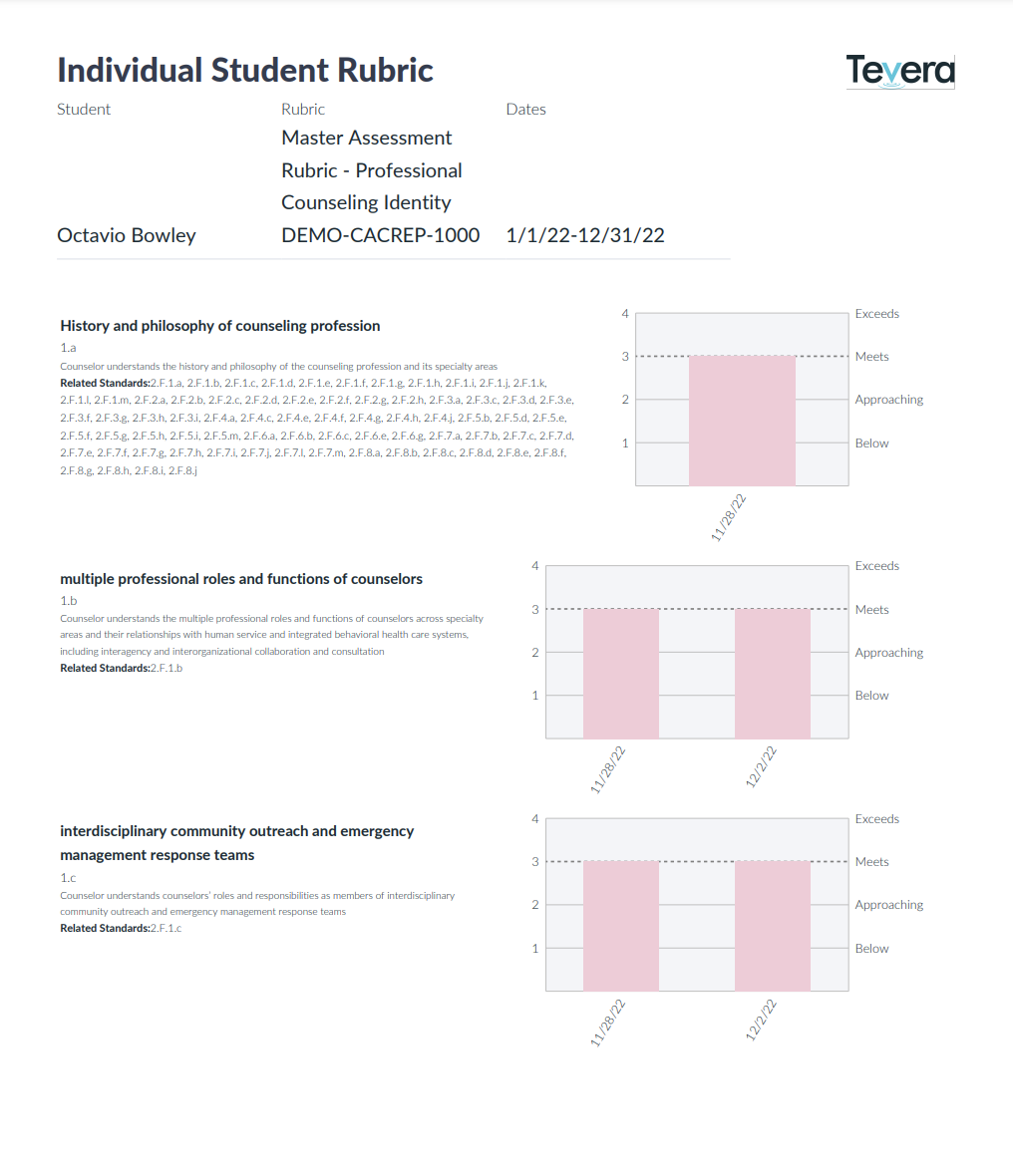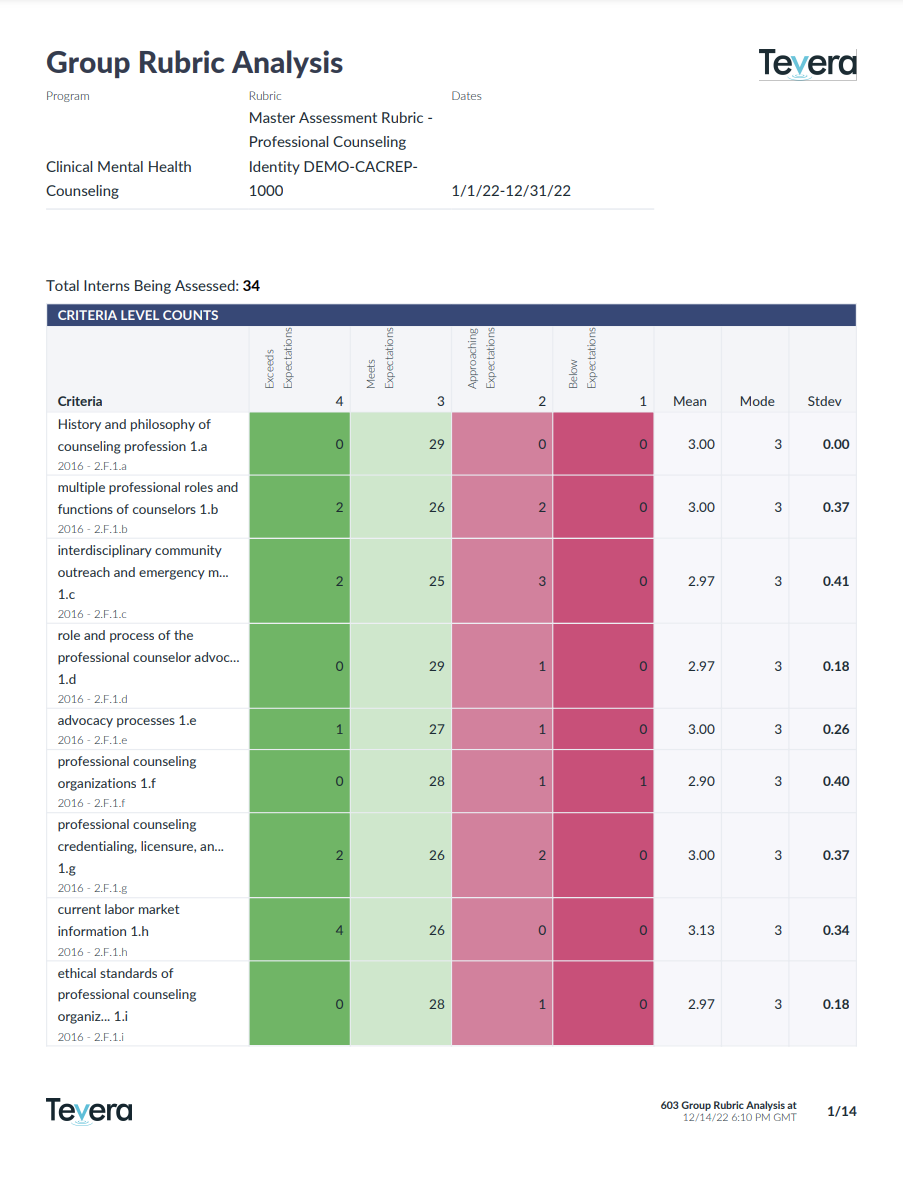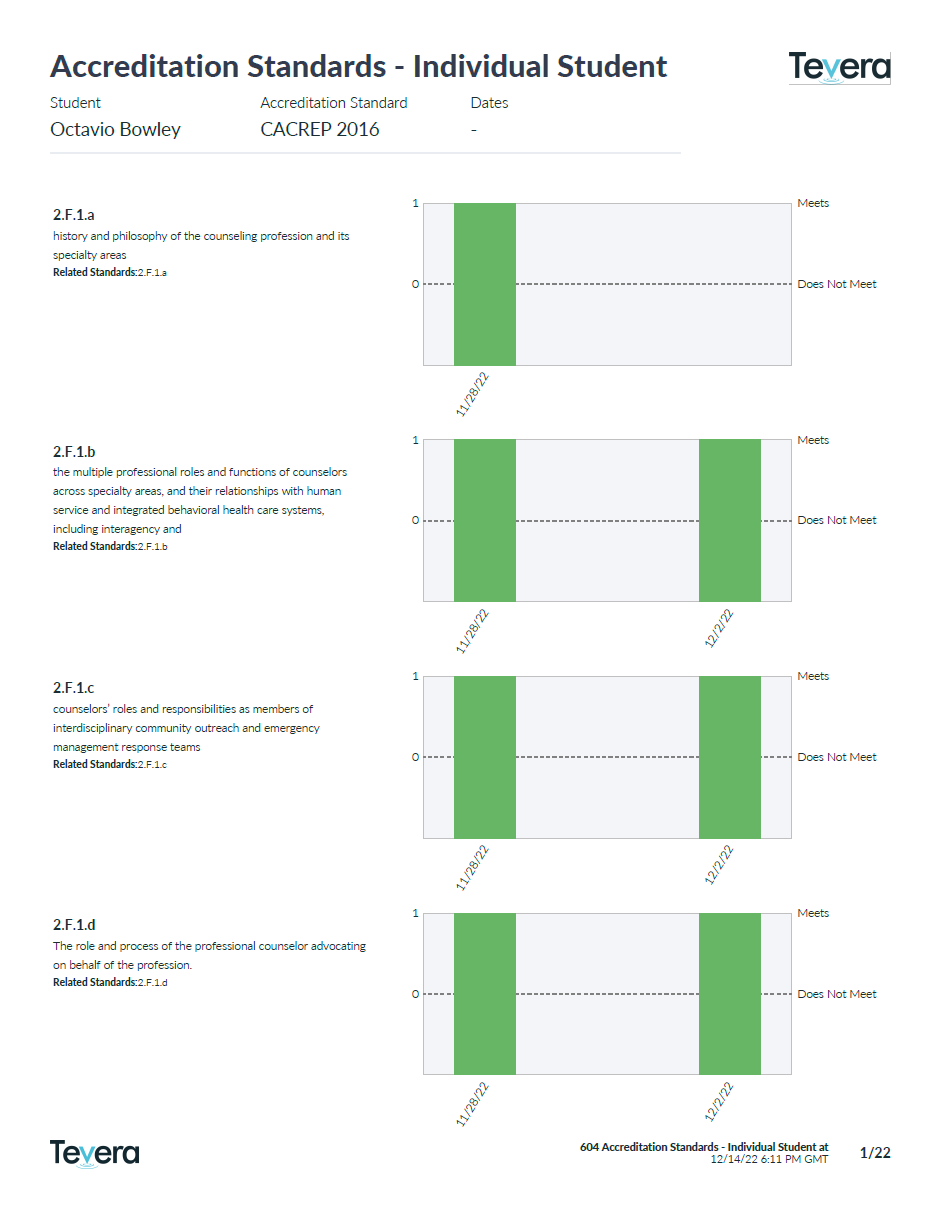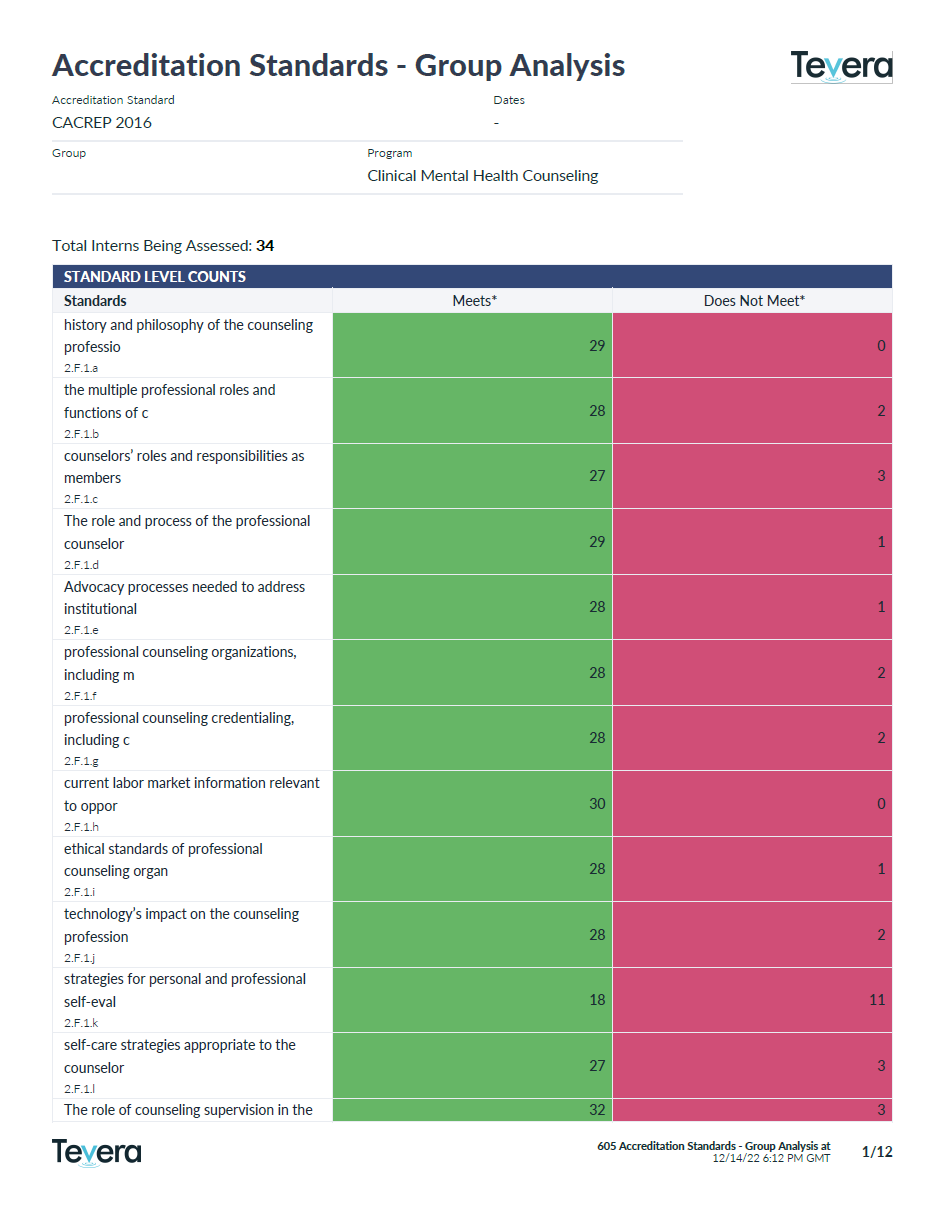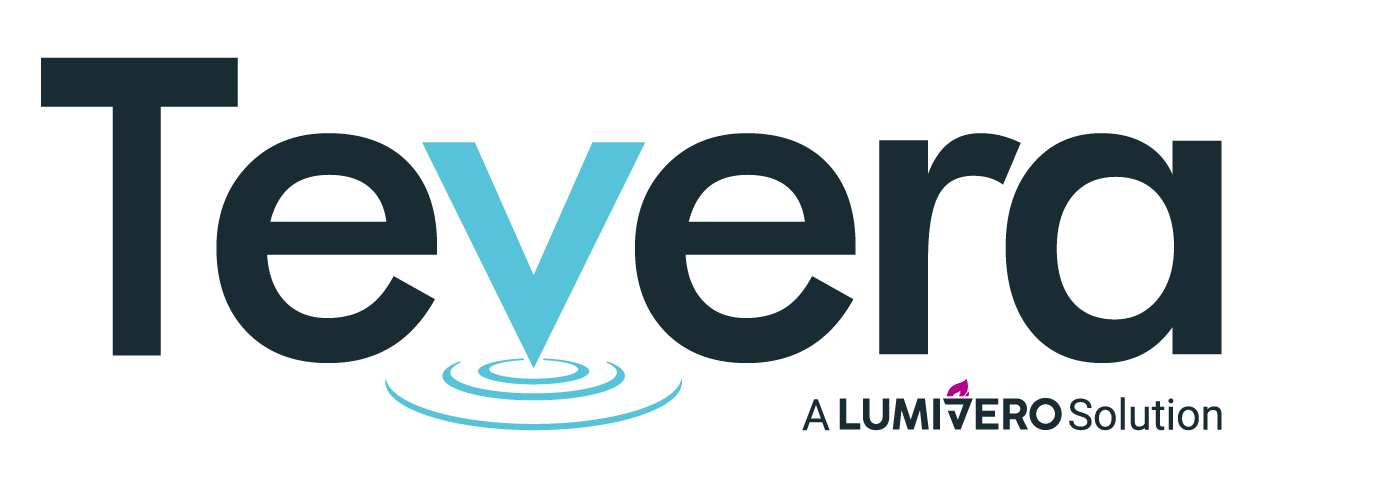CACREP Accreditation and Reaccreditation
The accreditation process is far from easy, but it is necessary to ensure long-term credibility and retain a competitive advantage. Adhering to a set of peer-reviewed, shared standards is important for students, educational institutions, practitioners, clients, and the industry as a whole. While significant time, organization, and planning will always be required, there are ways to make the process easier for your counselor education program.
This article is for counselor education program administrators involved in the reaccreditation process, specifically CACREP programs. Our goal is to show you the ways the reaccreditation process can be easier, less stressful, and more efficient.
A CACREP Refresher
If you’re new to accreditation in general, or CACREP specifically, we’ve put together a quick refresher.
The CACREP Reaccreditation Process
As a counselor education program, having the stamp of approval from CACREP is essential for programmatic success. The standards determined by CACREP ensure that consistent quality of education, training, and care are upheld.
The reaccreditation process could happen on two different timelines for your program: two years or eight years. Regardless of which timeline you are on, the process requires a significant amount of time, planning, financial resources, and organization.
Why is CACREP Reaccreditation so Difficult?
The process is not easy because it involves a lot of people and organizations (think students, administrators, professors and instructors, supervisors, etc.). The steps within the reaccreditation process, if neglected or put off, make the end result exponentially more difficult. We are referring to, of course, the ongoing data collection, such as tracking scores, evaluations, reports, and logs of students’ hours required by CACREP. Requirements can also change from one accreditation period to the next, making organization even more crucial.
Add in the potential for staff changes at a program throughout or between accreditation timelines, which only requires more training and more time, and it’s not hard to see why this process is dreaded by administrators across the U.S..
Reaccreditation is also not free. Programs need to budget for the $2,500 application fee, $2,000 cost per site visit visitor plus additional site visit costs, and a yearly membership fee ranging from $3,800–$4,000. All told, each reaccreditation cycle can cost more than $8,500, making careful budgeting an additional necessity.
CACREP Reaccreditation Standards
The standards set by CACREP are detailed and comprehensive. That doesn’t mean they’re easy to wade through. We simplified them to help you get a start but be sure to dive into CACREP’s full standards to get the most complete understanding of your next steps.
Understanding the standards your program will be evaluated against is crucial to a smooth reaccreditation process. CACREP’s current 2016 standards are to be followed until an update is released. The standards cover the following areas:
-
Section 1, The Learning Environment
- Standards for the institution, academic unit, and program faculty and staff
-
Section 2, Professional Counseling Identity
- Foundational standards and standards for the eight required core curriculum areas
-
Section 3, Professional Practice
- Standards related to clinical practice, including practicum, internship, supervisor qualifications, and practicum and internship course loads
-
Section 4, Evaluation in the Program
- Elements related to evaluation of the program, assessment of students, and evaluation of faculty and site supervisors
-
Section 5 A–H, Entry-Level Specialty Areas: Addiction Counseling; Career Counseling; Clinical Mental Health Counseling; Clinical Rehabilitation Counseling; College Counseling and Student Affairs; Marriage, Couple, and Family Counseling; School Counseling; Rehabilitation Counseling
- Specialized content for various programs.
-
Section 6, Doctoral Standards for Counselor Education and Supervision
- Doctoral-level program requirements, including the specialized content for core curriculum, and practicum and internship requirements.
CACREP offers training to program administrators and shares accreditation manuals about how best to collect and prepare the required information. Spending time reviewing these manuals, including what is needed to maintain CACREP accreditation, will help your program stay on top of what is required.
What Role Does Data Play in Reaccreditation?
Data is the foundation of a program’s reaccreditation application; it must be collected, then organized, and finally, presented clearly.
Gathering the data consists of thoroughly reviewing CACREP’s standards, noting what information is required and making sure the relevant parties, such as students, professors, and supervisors are accurately collecting that data, whether it is through logs, exam scores, or other records.
With information coming from a variety of streams and processes—i.e., paper, emails, digital files—the data then needs to be consolidated and organized. This can be one of the most time-consuming tasks for administrators because the work is detail-oriented and can be tedious.
After the data is organized and cleaned, it needs to be put into a format that is presentable to accreditation reviewers. Is all of the data in one place and easily pulled into a presentable format? Or will each report require detailed knowledge, making it difficult to repeat the next round of accreditation? Or are various individuals responsible for different reports?
Many of these questions are what cost you the most time and energy, but can be solved with data software partners like Tevera.
How Does Tevera Make the Reaccreditation Process Easier?
Tevera is designed to be a convenient, single collection point for any data related to CACREP standards section 3: Professional Practice via our field experience solution (link to FE page) and section 4: Evaluation in the Program via our program outcomes solution (link to PO page). Evaluate student performance in alignment with sections 2, 5, and 6 of the CACREP 2016 standards, and/or align assessment measures to your program’s own KPIs.
Tevera goes beyond being a place to store data because it gives you easy and fast tools to pull out reports that you need, simply with the click of a button. As someone in charge of the reaccreditation process for your counseling program, software like this allows you to have all the information and reports you need in one place, minimizing the time you spend gathering, cleaning, and preparing data.
Tevera’s CACREP Accreditation Reporting
Tevera’s robust assessment reports simplify gathering the reports you need for CACREP accreditation and reaccreditation. With just a couple of clicks, you can generate powerful reports on student and program outcomes. You’ll be able to pull comprehensive reports on student outcomes in any of the formats below, as well as filter them by assessor role, date range, cohort, or specialization for more targeted insights.
Simplify CACREP Accreditation With Tevera
Whether your school is striving to earn CACREP accreditation or reaccreditation, Tevera provides the resources and services your team needs to streamline and simplify managing field experience and program outcomes.
Schedule an overview with Tevera today to discover how our software can elevate your counseling program’s CACREP accreditation process.
SOLUTIONS
RELATED POSTS
PRODUCT OVERVIEW
See how Tevera can elevate your program.
CACREP Accreditation and Reaccreditation
The accreditation process is far from easy, but it is necessary to ensure long-term credibility and retain a competitive advantage. Adhering to a set of peer-reviewed, shared standards is important for students, educational institutions, practitioners, clients, and the industry as a whole. While significant time, organization, and planning will always be required, there are ways to make the process easier for your counselor education program.
This article is for counselor education program administrators involved in the reaccreditation process, specifically CACREP programs. Our goal is to show you the ways the reaccreditation process can be easier, less stressful, and more efficient.
A CACREP Refresher
If you’re new to accreditation in general, or CACREP specifically, we’ve put together a quick refresher.
The CACREP Reaccreditation Process
As a counselor education program, having the stamp of approval from CACREP is essential for programmatic success. The standards determined by CACREP ensure that consistent quality of education, training, and care are upheld.
The reaccreditation process could happen on two different timelines for your program: two years or eight years. Regardless of which timeline you are on, the process requires a significant amount of time, planning, financial resources, and organization.
Why is CACREP Reaccreditation so Difficult?
The process is not easy because it involves a lot of people and organizations (think students, administrators, professors and instructors, supervisors, etc.). The steps within the reaccreditation process, if neglected or put off, make the end result exponentially more difficult. We are referring to, of course, the ongoing data collection, such as tracking scores, evaluations, reports, and logs of students’ hours required by CACREP. Requirements can also change from one accreditation period to the next, making organization even more crucial.
Add in the potential for staff changes at a program throughout or between accreditation timelines, which only requires more training and more time, and it’s not hard to see why this process is dreaded by administrators across the U.S..
Reaccreditation is also not free. Programs need to budget for the $2,500 application fee, $2,000 cost per site visit visitor plus additional site visit costs, and a yearly membership fee ranging from $3,800–$4,000. All told, each reaccreditation cycle can cost more than $8,500, making careful budgeting an additional necessity.
CACREP Reaccreditation Standards
The standards set by CACREP are detailed and comprehensive. That doesn’t mean they’re easy to wade through. We simplified them to help you get a start but be sure to dive into CACREP’s full standards to get the most complete understanding of your next steps.
Understanding the standards your program will be evaluated against is crucial to a smooth reaccreditation process. CACREP’s current 2016 standards are to be followed until an update is released. The standards cover the following areas:
-
Section 1, The Learning Environment
- Standards for the institution, academic unit, and program faculty and staff
-
Section 2, Professional Counseling Identity
- Foundational standards and standards for the eight required core curriculum areas
-
Section 3, Professional Practice
- Standards related to clinical practice, including practicum, internship, supervisor qualifications, and practicum and internship course loads
-
Section 4, Evaluation in the Program
- Elements related to evaluation of the program, assessment of students, and evaluation of faculty and site supervisors
-
Section 5 A–H, Entry-Level Specialty Areas: Addiction Counseling; Career Counseling; Clinical Mental Health Counseling; Clinical Rehabilitation Counseling; College Counseling and Student Affairs; Marriage, Couple, and Family Counseling; School Counseling; Rehabilitation Counseling
- Specialized content for various programs.
-
Section 6, Doctoral Standards for Counselor Education and Supervision
- Doctoral-level program requirements, including the specialized content for core curriculum, and practicum and internship requirements.
CACREP offers training to program administrators and shares accreditation manuals about how best to collect and prepare the required information. Spending time reviewing these manuals, including what is needed to maintain CACREP accreditation, will help your program stay on top of what is required.
What Role Does Data Play in Reaccreditation?
Data is the foundation of a program’s reaccreditation application; it must be collected, then organized, and finally, presented clearly.
Gathering the data consists of thoroughly reviewing CACREP’s standards, noting what information is required and making sure the relevant parties, such as students, professors, and supervisors are accurately collecting that data, whether it is through logs, exam scores, or other records.
With information coming from a variety of streams and processes—i.e., paper, emails, digital files—the data then needs to be consolidated and organized. This can be one of the most time-consuming tasks for administrators because the work is detail-oriented and can be tedious.
After the data is organized and cleaned, it needs to be put into a format that is presentable to accreditation reviewers. Is all of the data in one place and easily pulled into a presentable format? Or will each report require detailed knowledge, making it difficult to repeat the next round of accreditation? Or are various individuals responsible for different reports?
Many of these questions are what cost you the most time and energy, but can be solved with data software partners like Tevera.
How Does Tevera Make the Reaccreditation Process Easier?
Tevera is designed to be a convenient, single collection point for any data related to CACREP standards section 3: Professional Practice via our field experience solution (link to FE page) and section 4: Evaluation in the Program via our program outcomes solution (link to PO page). Evaluate student performance in alignment with sections 2, 5, and 6 of the CACREP 2016 standards, and/or align assessment measures to your program’s own KPIs.
Tevera goes beyond being a place to store data because it gives you easy and fast tools to pull out reports that you need, simply with the click of a button. As someone in charge of the reaccreditation process for your counseling program, software like this allows you to have all the information and reports you need in one place, minimizing the time you spend gathering, cleaning, and preparing data.
Tevera’s CACREP Accreditation Reporting
Tevera’s robust assessment reports simplify gathering the reports you need for CACREP accreditation and reaccreditation. With just a couple of clicks, you can generate powerful reports on student and program outcomes. You’ll be able to pull comprehensive reports on student outcomes in any of the formats below, as well as filter them by assessor role, date range, cohort, or specialization for more targeted insights.
Simplify CACREP Accreditation With Tevera
Whether your school is striving to earn CACREP accreditation or reaccreditation, Tevera provides the resources and services your team needs to streamline and simplify managing field experience and program outcomes.
Schedule an overview with Tevera today to discover how our software can elevate your counseling program’s CACREP accreditation process.
CACREP Accreditation and Reaccreditation
The accreditation process is far from easy, but it is necessary to ensure long-term credibility and retain a competitive advantage. Adhering to a set of peer-reviewed, shared standards is important for students, educational institutions, practitioners, clients, and the industry as a whole. While significant time, organization, and planning will always be required, there are ways to make the process easier for your counselor education program.
This article is for counselor education program administrators involved in the reaccreditation process, specifically CACREP programs. Our goal is to show you the ways the reaccreditation process can be easier, less stressful, and more efficient.
A CACREP Refresher
If you’re new to accreditation in general, or CACREP specifically, we’ve put together a quick refresher.
The CACREP Reaccreditation Process
As a counselor education program, having the stamp of approval from CACREP is essential for programmatic success. The standards determined by CACREP ensure that consistent quality of education, training, and care are upheld.
The reaccreditation process could happen on two different timelines for your program: two years or eight years. Regardless of which timeline you are on, the process requires a significant amount of time, planning, financial resources, and organization.
Why is CACREP Reaccreditation so Difficult?
The process is not easy because it involves a lot of people and organizations (think students, administrators, professors and instructors, supervisors, etc.). The steps within the reaccreditation process, if neglected or put off, make the end result exponentially more difficult. We are referring to, of course, the ongoing data collection, such as tracking scores, evaluations, reports, and logs of students’ hours required by CACREP. Requirements can also change from one accreditation period to the next, making organization even more crucial.
Add in the potential for staff changes at a program throughout or between accreditation timelines, which only requires more training and more time, and it’s not hard to see why this process is dreaded by administrators across the U.S..
Reaccreditation is also not free. Programs need to budget for the $2,500 application fee, $2,000 cost per site visit visitor plus additional site visit costs, and a yearly membership fee ranging from $3,800–$4,000. All told, each reaccreditation cycle can cost more than $8,500, making careful budgeting an additional necessity.
CACREP Reaccreditation Standards
The standards set by CACREP are detailed and comprehensive. That doesn’t mean they’re easy to wade through. We simplified them to help you get a start but be sure to dive into CACREP’s full standards to get the most complete understanding of your next steps.
Understanding the standards your program will be evaluated against is crucial to a smooth reaccreditation process. CACREP’s current 2016 standards are to be followed until an update is released. The standards cover the following areas:
-
Section 1, The Learning Environment
- Standards for the institution, academic unit, and program faculty and staff
-
Section 2, Professional Counseling Identity
- Foundational standards and standards for the eight required core curriculum areas
-
Section 3, Professional Practice
- Standards related to clinical practice, including practicum, internship, supervisor qualifications, and practicum and internship course loads
-
Section 4, Evaluation in the Program
- Elements related to evaluation of the program, assessment of students, and evaluation of faculty and site supervisors
-
Section 5 A–H, Entry-Level Specialty Areas: Addiction Counseling; Career Counseling; Clinical Mental Health Counseling; Clinical Rehabilitation Counseling; College Counseling and Student Affairs; Marriage, Couple, and Family Counseling; School Counseling; Rehabilitation Counseling
- Specialized content for various programs.
-
Section 6, Doctoral Standards for Counselor Education and Supervision
- Doctoral-level program requirements, including the specialized content for core curriculum, and practicum and internship requirements.
CACREP offers training to program administrators and shares accreditation manuals about how best to collect and prepare the required information. Spending time reviewing these manuals, including what is needed to maintain CACREP accreditation, will help your program stay on top of what is required.
What Role Does Data Play in Reaccreditation?
Data is the foundation of a program’s reaccreditation application; it must be collected, then organized, and finally, presented clearly.
Gathering the data consists of thoroughly reviewing CACREP’s standards, noting what information is required and making sure the relevant parties, such as students, professors, and supervisors are accurately collecting that data, whether it is through logs, exam scores, or other records.
With information coming from a variety of streams and processes—i.e., paper, emails, digital files—the data then needs to be consolidated and organized. This can be one of the most time-consuming tasks for administrators because the work is detail-oriented and can be tedious.
After the data is organized and cleaned, it needs to be put into a format that is presentable to accreditation reviewers. Is all of the data in one place and easily pulled into a presentable format? Or will each report require detailed knowledge, making it difficult to repeat the next round of accreditation? Or are various individuals responsible for different reports?
Many of these questions are what cost you the most time and energy, but can be solved with data software partners like Tevera.
How Does Tevera Make the Reaccreditation Process Easier?
Tevera is designed to be a convenient, single collection point for any data related to CACREP standards section 3: Professional Practice via our field experience solution (link to FE page) and section 4: Evaluation in the Program via our program outcomes solution (link to PO page). Evaluate student performance in alignment with sections 2, 5, and 6 of the CACREP 2016 standards, and/or align assessment measures to your program’s own KPIs.
Tevera goes beyond being a place to store data because it gives you easy and fast tools to pull out reports that you need, simply with the click of a button. As someone in charge of the reaccreditation process for your counseling program, software like this allows you to have all the information and reports you need in one place, minimizing the time you spend gathering, cleaning, and preparing data.
Tevera’s CACREP Accreditation Reporting
Tevera’s robust assessment reports simplify gathering the reports you need for CACREP accreditation and reaccreditation. With just a couple of clicks, you can generate powerful reports on student and program outcomes. You’ll be able to pull comprehensive reports on student outcomes in any of the formats below, as well as filter them by assessor role, date range, cohort, or specialization for more targeted insights.
Simplify CACREP Accreditation With Tevera
Whether your school is striving to earn CACREP accreditation or reaccreditation, Tevera provides the resources and services your team needs to streamline and simplify managing field experience and program outcomes.
Schedule an overview with Tevera today to discover how our software can elevate your counseling program’s CACREP accreditation process.

